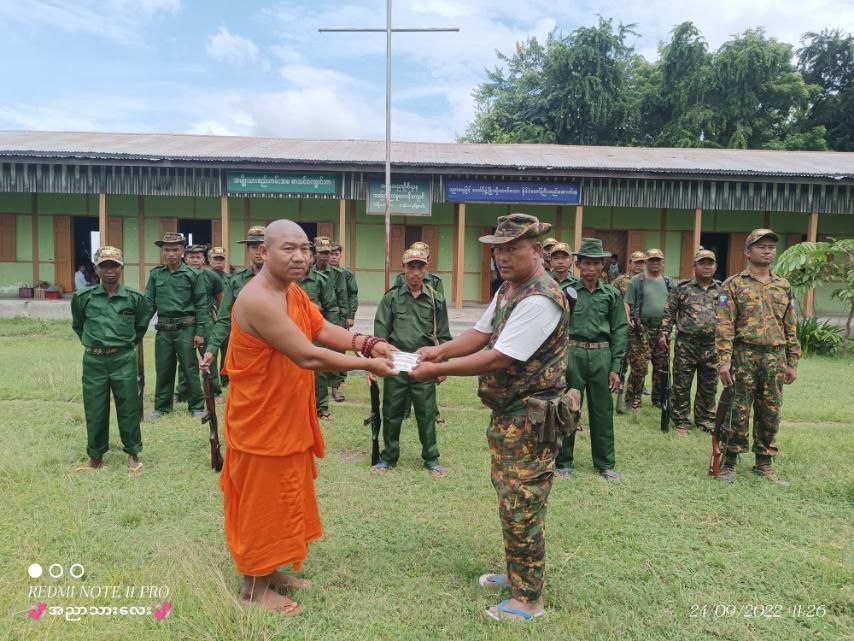
Myanmar’s coup regime is using state funds reserved for disaster relief, regional development, and monastic institutions to finance militia groups fighting resistance forces, documents obtained by Myanmar Now have revealed.
Letters exchanged between departments of the junta’s Sagaing Region administration over the past two months show that some 160 members of army-trained Pyu Saw Htee militia groups in Kanbalu and Taze townships received more than 4m kyat ($1,900) in cash recently to buy staple foods.
The Pyu Saw Htee groups, many of whose members are pro-army nationalists, war veterans, or backers of the military’s proxy party, typically accompany soldiers on village raids and attacks on the strongholds of armed anti-junta groups.
The regime has been especially active in organising the groups in northwestern and central Myanmar—particularly Sagaing Region—where resistance forces have gained a firm foothold in many areas due to strong public support.
Soe Shwe Aung, the chair of the junta’s Kanbalu District Administration Department, handed over the money to nationalist monk U Warthawa on October 20, the letters showed. The money will be used to support 40 militia members in the village of Kan Phyu in Kanbalu Township, 70 elsewhere in the township, and 50 in neighbouring Taze Township.
The letters explicitly state that the money was taken from funds reserved for Kanbalu District’s disaster relief activities, developmental work, and monasteries. The spending was approved by Sagaing Region’s administrative body.
U Warthawa has played a leading role in recruiting Pyu Saw Htee members in Sagaing Region. Earlier this year, while visiting villages in Kanbalu, Taze and Kyunla townships, he declared that communities that financially support anti-regime groups should be “eradicated.”
“If it is true that some villages are financing them, then we need to teach them a lesson. We will erase those villages from the map of Myanmar. This is something we need to uproot,” he said at the time.
More recently, he was seen in a video shared on pro-military social media accounts denouncing junta opponents in crude terms to a group of around 70 recent Pyu Saw Htee recruits.
“They’re destroying our country, race and religion. Those quislings and sons of bitches!” he is heard saying in a speech delivered on October 20, the same day that he received state funds from the regime.
According to resistance sources, Pyu Saw Htee groups have a strong presence in around 40 villages in Kanbalu, Taze and Kyunla townships.
Villagers close to the militias say that regular members are paid 170,000 kyat ($80) a month, while leaders receive a salary of 210,000 kyat ($100).
“They are also given free uniforms these days, as an added incentive to join,” said one Kanbalu Township resident who knows several militia members.
As the conflict continues to drag on, many are drawn by a chance to earn some money, he added.
“In Kan Phyu, some people join because there is nothing else for them to do. It’s impossible to do any kind of business in such chaotic times,” said the local, who did not want to be named.
In March, junta spokesperson General Zaw Min Tun announced plans to train and arm civilians, including local administrators, as part of the regime’s effort to crush resistance to its rule.
U Waryama, a leading monk from the anti-regime Interfaith Network for Spring Revolution, described the junta’s use of funds for relief and monastic activities as “shameful.”
“It is shameful for our country and our Buddhist people that the military, together with the monk Warthawa, is using those funds to brutally murder people,” he said.



